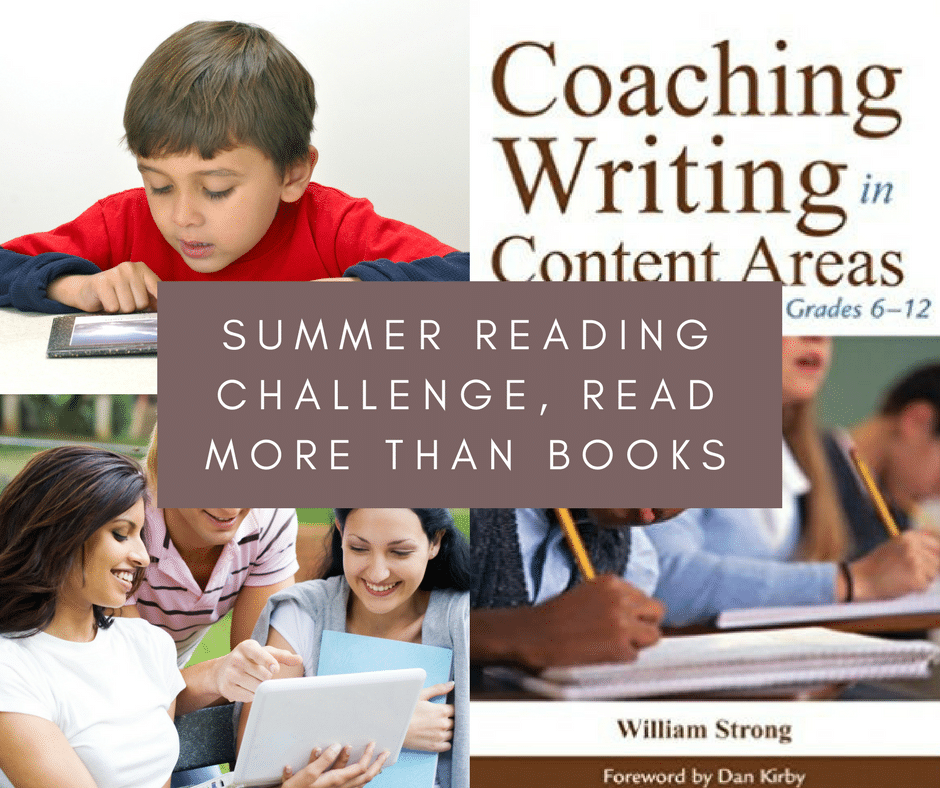Change that paradigm! Reading should not be books alone. Summer reading time is my true professional development, experimenting with genres and digital literacy tools set aside during the busier terms of the year. I organize my reading hours similar to the organization of my running workouts. Workouts are separated into distance, easy, tempo, interval, and races while reading is organized into pleasure, professional, informative, and experimental. Without this, I tend to spend too many hours of a family vacation working in my profession.
Read for pleasure– I use summer to catch up on experiences that pass me by during the school year. I finally have the time to read the entire Sunday New York Times. Sometimes it takes a day, sometimes I use the entire week but to afford the luxury of time happens only erratically during the school year. Similarly, I have caught up on my film/ t.v. episodes of HBO’s Game of Thrones while I’m finishing book two of George R.R. Martin’s A Clash of Kings. I move back and forth between reading the novel, reading about the characters on fan blogs and returning to film episodes that I didn’t quite understand the first time I watched them. It is fun to become entranced in fantasy and to find connections to G.O.T. communities wherever I travel in the summertime. I Finally have the time to read Donna Tart’s, The Goldfinch and Arundhati Roy’s The God of Small Things.
Professional reading. Outside of readings for an online workshop, a friend and colleague asked me to volunteer to sit on a school committee to study game design and gamification. She received a fellowship to study and build stronger communities within the framework of Understanding By Design. In preparation for discussions and collaboration in the fall, I’ve been assigned Matthew Farber’s Gamify Your Classroom. I look forward to weekly readings of blogs and posts tagged in our Google Circle over course of my summer break. I read professionally every other morning or night without sacrificing family time. The analysis of the game construct sometimes melds into family time. My daughter is essentially my lab assistant who effortlessly mentors me through games that I flounder in. It is easy to scoff at gaming as a waste of time but it has a language and a construct worth reading into.
Informative. Educators ask students to engage in assigned reading all the time. Rarely do we ask them for a reading list in return. I assigned my AP students choice readings from an extensive list of historic novels. I then use their reviews of historic analysis as motivation for rereading and reconnecting with a classic. A student who make a request that is not on my list inspire me. My daughter is urging me to read, I Am Malala which I had skipped until now despite its popularity. I have read many articles but never Malala’s autobiography. Similarly, I follow Leanin.org and had assigned Sheryl Sandberg’s Lean In without ever made time to read it. I hope to juxtapose the book with the site and its incredible team of women out there inspiring others with ongoing dialogues concerning empowerment. Sensibilities push me to follow up readings with presentations via TedTalks. Sandberg’s voice is what drew me into this circle in the first place. I hope to remember that the management of visual, audio and text is especially crucial to student understandings in a classroom setting. I need to give students time for routine experiences with all of these senses if I want students to do more than checking a book off of a list.
Experimental means not limiting reading experiences to favorite genres. I just finished reading Steven Levitt and Stephen Dubner’s economic argument, Think Like a Freak on my Kindle app. It I practiced using Kindle’s interactive features as my students would: highlighting passages, taking notes and exploring the internet features for extended background knowledge. I plan to rely on these extensions when I delve into the medical writings of Atul Gawande for the first time. In historic fiction, I read A Sea of Poppies by Amitov Gosh. My lack of comprehension of Malay dialect slowed my reading speed. I read to build knowledge around unfamiliar vocabulary and then rereading to realign the story. For any reader struggling to balance context and meaning I highly recommend audio books. I rely on Audible and other audio platforms provided by my local libraries. I then combine my morning run with listening to the fluent reading of A Sea of Poppies restoring the beauty of great storytelling.
Experimental news. During the school term, my lunch group sets up for 20 minutes of dialectic review of news gathered from familiar sources: the New York Times, the Economist, CNN. A year following independent journalists, Democracy Now and MintPress through Twitter changed my contribution to our conversations. These sources were first to cover issues before popular media had the courage to do so. Prioritizing news in a manner different from the norm also led me to discover other syndicates: Slate, Mashup, Huffington Post Women and Marie Claire. From this shift I discovered that Bernie Sanders has a chance at the presidency, Ruth Bader Ginsburg’s popularity (RBG) has a cult following and the #womenonthetwenty is a real movement. Summer hours of experimentation afford me opportunities to gather diverse opinions and apps for organizing how my news is followed.
July marks the start of a cross-country road trip, a stack of virtual and real readings and a car of agreeable family members willing to add their “two cents”. Just in case I am outnumbered, I have my virtual literary communities and my book club home girls to turn to. Reading is about connecting and isn’t it what we hope to instill in students this fall? What are you reading outside the usual? Please share.





